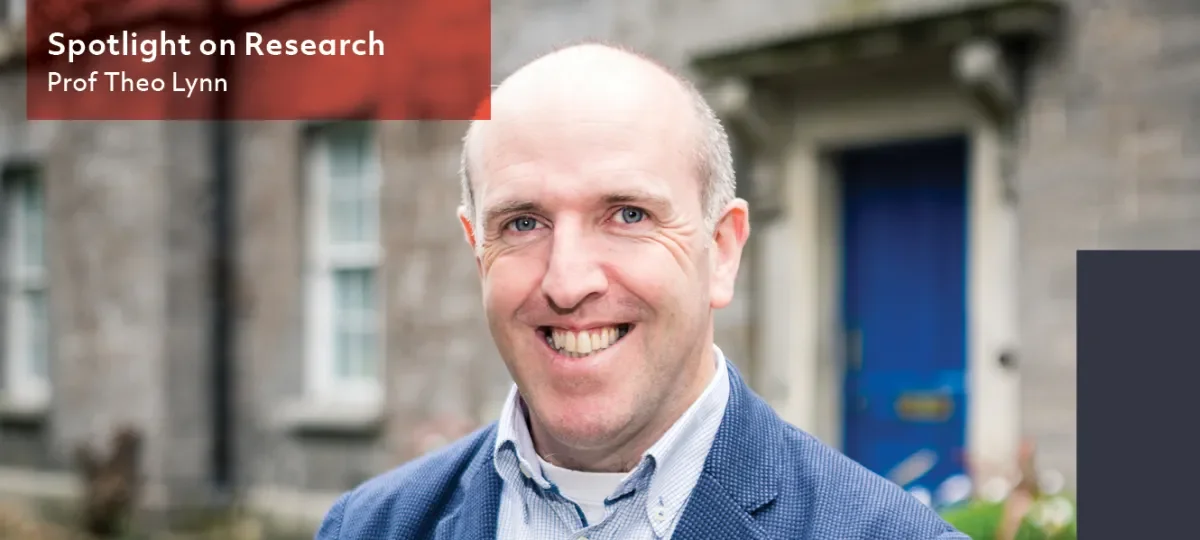

Adding value through the cloud
This week's Spotlight on Research is with Professor Theo Lynn, Professor of Digital Business, DCU School of Business, Principal Investigator at the Irish Centre for Cloud Computing and Commerce (IC4)
What was your path into research?
“My background is a bit unconventional. I set up and sold three software businesses, mainly in e-learning and what was then the emergence of cloud computing.
I was interested in corporate governance so I went and did a PhD in Law at University College Dublin. Then around the time I sold my last business, I moved to DCU to teach strategy in the Business School. Since then I have grown my research group.”
What kinds of areas interest you?
“By my nature I’m interested in a lot of things, and I think there are some big technology trends that are transforming how society, business, and really how everything works: social media, cloud computing, big data, mobile, the Internet of Things and more recently Blockchain.
I am interested in how those technologies change particular sectors and functions in organisations.”
What kinds of projects do you do?
“I’m a little different to many academic researchers in that I tend to work on lots of small funded projects. I have some big projects, like Horizon 2020 ones, but I have done about 200 small funded projects since coming to DCU.
Most of what we do is collaborations and small interventions with companies.
We work with everyone from funeral directors to cloud computing companies and we help them innovate in different ways. Not just R&D innovation like building new products but non-R&D innovation like marketing optimisation.
Our goals, through our research or intervention, is to create value for them and keep our own knowledge up to date through application.”
Cloud computing, which uses the Internet to deliver services, is a big research interest for you. How did you become interested in that?
“From personal experience. A big barrier for my startups, back in the day, was the buying, setting up, and maintaining IT infrastructure.
Cloud computing transformed that experience. I’m jealous of today’s startups! Building on our experience of working with Irish SMEs, we were successful in winning the grant to set up the Irish Centre for Cloud Computing and Commerce, an Enterprise Ireland/IDA Technology Centre.
With colleagues in UCC and AIT, we do industry-led research: industry picks the projects and we research them, typically in short timeframe sprint projects.
We look at how companies migrate to the cloud, what kinds of architectures do they need and what kind of quality of service issues do they face.
Obviously another big area for us is trust and specifically data privacy and data protection in the cloud.”
What else is changing about how we use the Internet?
“Another area I’m really interested in is the Internet of Things, which deals with the area of connected devices.
We have an EU-funded project called RECAP which looks at how the data centres and ICT infrastructure needs to be configured or optimised to accommodate the billions of things that will be connected online in the future.
These connected things have different requirements for communications, connectivity, and decision making. Sometimes there is no connectivity or sometimes connectivity is intermittent and this creates different demands on both IT and telecommunication infrastructure.
The sheer volume of connected things and the data that these things generate and consume is too complex for manual decision making on infrastructure optimisation.
As such, we need to make decision making somewhat autonomic and our focus is designing systems and feedback loops that support these autonomic processes.”
You are also interested in social media, tell us about that?
“Social media provides a great window on the world and the data generated can allow researchers work in a sandbox without worrying about where the data is coming from.
Due to the volume, variety, and velocity of data, we need technologies like cloud computing to store, process and analyse this data.
Our team look at social media and use data analytics to get insights particularly about electronic word of mouth, what generates discussion and why.
We’ve done projects on a wide range of projects and it really is a great way to start collaborations with other researchers in DCU and beyond.
We’ve done papers on everything from terrorist events to fintech to the English Premier League.
As well as electronic word of mouth, right now we’re quite interested in bots and the role they are playing not only in politics but marketing. It's an exciting time.”
How does your background as entrepreneur influence your approach to research?
“I think if you have been in startups it is sometimes easier to work in a fluid space where you have a lot of cross-fertilisation of different ideas.
I’m also a big fan of learning by doing, and we do that a lot with the social media analysis projects, where a lot of the ideas are generated from our use of social media.
I think it also helps us in how we approach research dissemination and exploitation.”
Where do you see the value of your research?
“A big focus for me is how our research informs the subjects we teach.
Obviously, the nature of industry-led or applied research also generates value for the clients we work with.
I don’t tend to focus as much on publishing articles in academic journals but rather getting the research out as fast as possible before it goes out of date.
The areas we work on change rapidly so this is key.
As a former or occasional entrepreneur, I probably value research more when it translates in to a company improving sales with technology, or seeing a process improved or transformed.
That can have enormous value for enterprise and for society. And hopefully creates jobs for our graduates!”
